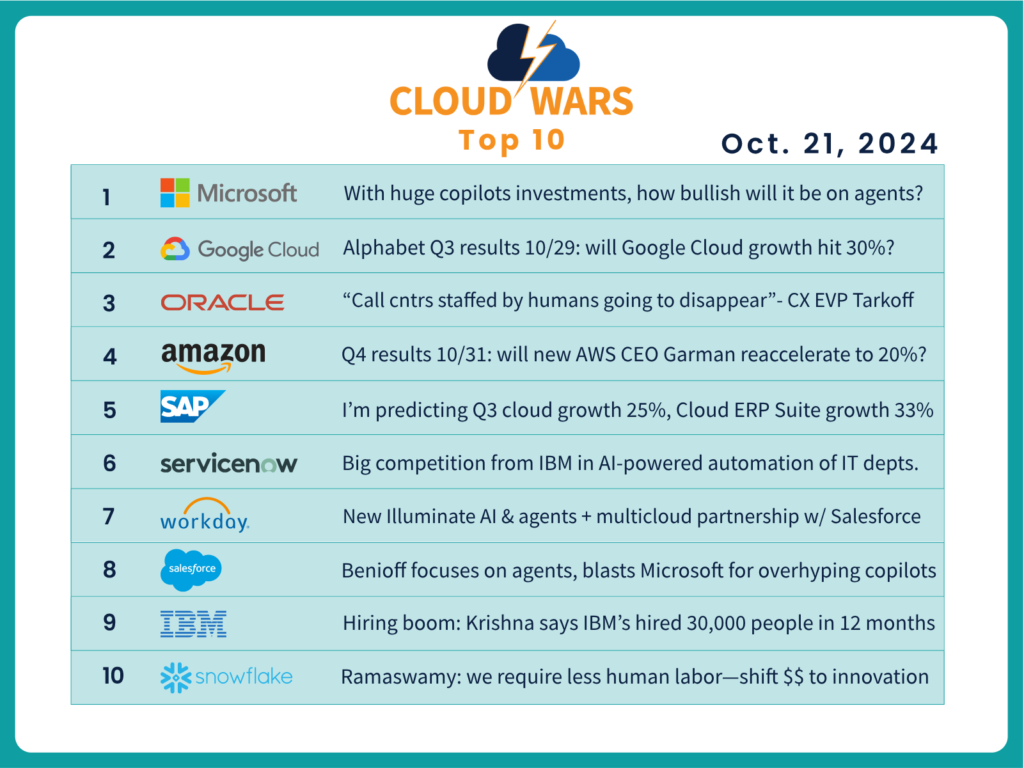
Underscoring his commitment to transforming IBM into a growth company, CEO Arvind Krishna said IBM hired 30,000 people in 2023 to bring in more people in key areas and to significantly expand the presence of a “growth mindset” across the iconic company.
Noting that IBM has 270,000 employees, Krishna said, “Are they all willing to be more growth-oriented and to lean in on opportunities? I think 80% of our people are. But the other 20% have to be replaced — this is simply no longer the place for them.”
Krishna’s bracing remarks about the difficult and probably company-saving transformation he’s been leading at IBM for the past 4-1/2 years came during an hour-long Q&A session with industry analysts at the company’s modern new headquarters in New York City last week.
Ask Cloud Wars AI Agent about this analysis
The changes Krishna has led since his arrival as CEO in April 2020 at the outset of the pandemic include:
- a dramatic overhaul of the company’s formerly bloated and unfocused product portfolio;
- a brilliant strategic shift away from competing across the entire enterprise-tech spectrum and toward growth-enhancing partnerships with most of the Cloud Wars Top 10;
- a reinvigoration of IBM Research away from all “R” with not so much “D” so that its new mission is “to be the growth engine of IBM,” in the words of senior VP and head of research Dario Gil;
- a unified IBM Consulting team that’s focused around helping clients accelerate, innovate, and realize rapid time to value;
- an ambitious and increasingly successful relaunch of its AI brand as the “watsonx” AI and data platform; and
- an unflinching makeover of its talent lineup across all departmental lines and across the globe.
Speaking of that at-risk 20% that are not willing to “lean in” and be a part of IBM’s new growth-oriented personality, Krishna said, “There are places for that sort of outlook–but not here.”
I want to be sure to note here that since the beginning of 2024, IBM’s market cap has risen more than 30% — from $160 billion to about $214 billion — as Krishna’s internal moves have begun to reverberate externally among customers, partners, and other stakeholders.
Whereas in the not-too-distant past IBM customers and prospects would have seen an IBM whose sales organizations competed with each other and in many respects were pushing the status quo, today they are viewing a very different IBM that is deeply steeped in AI and data capabilities that can drive great business outcomes, particularly through the revamped IBM Consulting.
“When business are not doing well, it’s easy for them to take on a culture where they get extremely internally focused and become very risk-averse,” Krishna said. And then he gave a great example of how that overly cautious and risk-averse mindset manifests itself: A CEO pushes a new initiative, and asks the leadership team how much it will cost and when it can be ready.
The leaders, paralyzed by caution, dramatically inflate the cost and offer a bloated timetable. Making it even worse, Krishna said, managers trapped in that risk-averse mindset also play down the scale and scope of what they can deliver in that flabby timeframe in spite of the overblown budget.
“So I tell them, ‘Give me a date that you have 70% confidence in and let’s work with that’–that generally surprises them, but they’re almost always more willing to jump in.”
Final Thought
IBM reports its Q3 numbers tomorrow, Oct. 23, and we’ll then get a better sense of how deeply Krishna’s “lean in” message is radiating through IBM’s people to customers and prospects. I’m looking for IBM Consulting and Hybrid Cloud units to lead the way, with particularly strong AI revenue growth from the consulting team.










